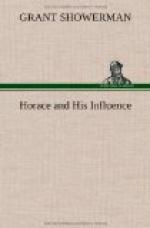We have seen how the Pleiad, with Du Bellay and Ronsard leading, seized upon the classics as a means of elevating the literature of France, and how the treatise of Du Bellay which was put forth as their manifesto was full of matter from the Ars Poetica, which two years previously has served Sibilet also, whose work Du Bellay attacked. A century later, Boileau’s L’Art Poetique testifies again to the inspiration of Horace, who is made the means of riveting still more firmly upon French drama, for good or ill, the strict rules that have always governed it; and by the time of Boileau’s death the program of the Pleiad is revived a second time by Jean Baptiste Rousseau. Opitz and Gottsched in the seventeenth and eighteenth centuries are for Germany what Du Bellay and Boileau were for France in the sixteenth and seventeenth. Literary Spain of the latter fifteenth and early sixteenth centuries was under the same influence. The Spanish peninsula, according to Menendez y Pelayo, has produced no fewer than forty-seven translations of the Ars Poetica. Even in England, always less tractable in the matter of rules than the Latin countries, Ben Jonson and his friends are in some sort another Pleiad, and the treatise possesses immense authority throughout the centuries. We turn the pages of Cowl’s The Theory of Poetry in England, a book of critical extracts illustrating the development of poetry “in doctrines and ideas from the sixteenth century to the nineteenth century,” and note Ben Jonson and Wordsworth referring to or quoting Horace in the section on Poetic Creation; Dryden and Temple appealing to him and Aristotle on the Rules; Hurd quoting him on Nature and the Stage; Roger Ascham, Ben Jonson, and Dryden citing him as an example on Imitation; Dryden and Chapman calling him master and law-giver on Translation; Samuel Johnson referring to him on the same subject; and Ben Jonson and Dryden using him on Functions and Principles of Criticism. “Horace,” writes Jonson, “an author of much civility, ... an excellent and true judge upon cause and reason, not because he thought so, but because he knew so out of use and experience.” Pope, in the Essay on Criticism, describes with peculiar felicity both Horace’s critical manner and the character of the authority, persuasive rather than tyrannical, which he exercises over Englishmen:
“H_orace still charms with graceful
negligence_,
A_nd without method talks us into sense_;
W_ill, like a friend, familiarly convey_
T_he truest notions in the easiest way_.”
But the dynamic power of the Ars Poetica will be still better appreciated if we assemble some of its familiar principles. Who has not heard of and wondered at the hold the “Rules” have had upon modern drama, especially in France,—the rule of five acts, no more and no less; the rule of three actors only, liberalized into the rule of economy; the rule of the unities in time, place, and action;




